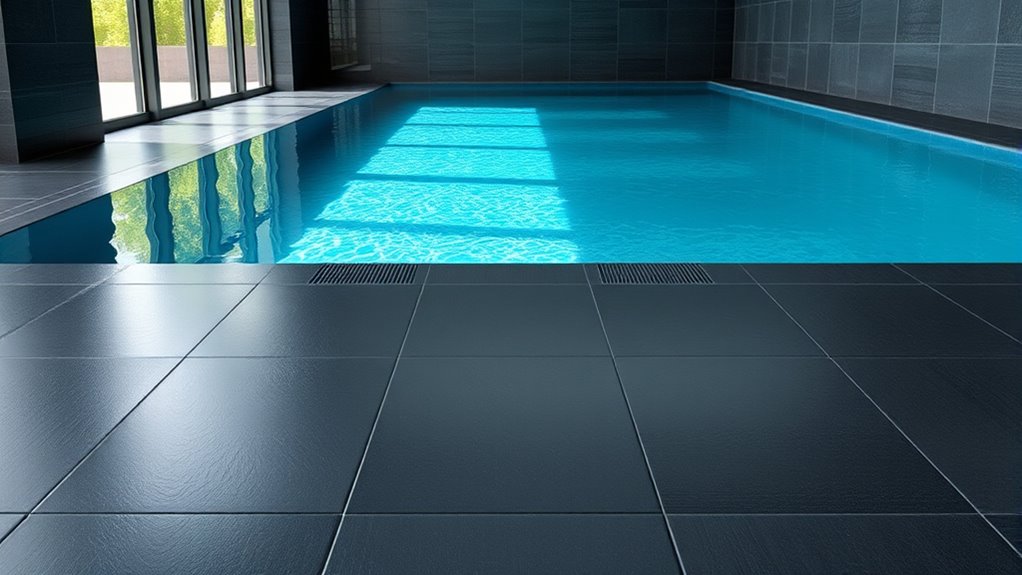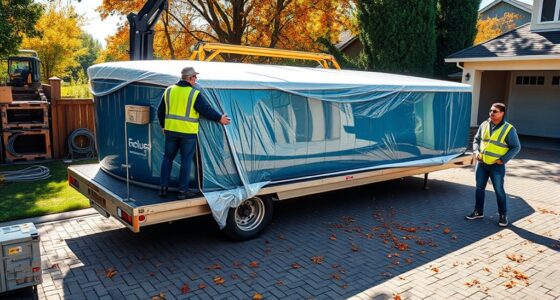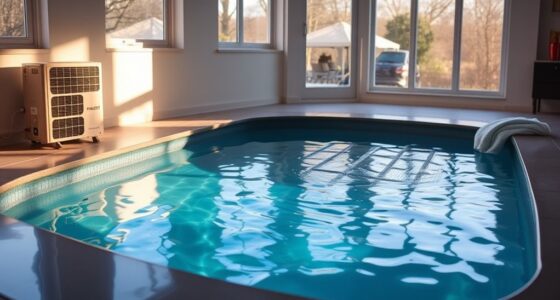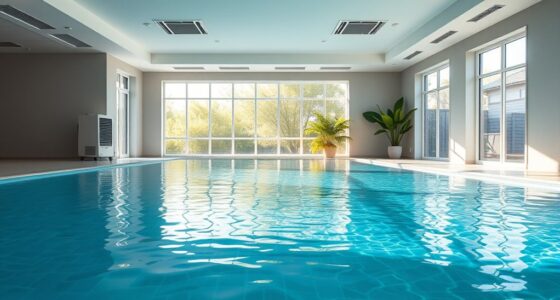For the area under your endless pool, choose slip-resistant, water-resistant flooring like textured concrete, rubber mats, or outdoor tiles. These options are durable, safe, and easy to maintain, resisting mold and damage from moisture and UV rays. Rubber and foam mats offer comfort and shock absorption, while vinyl and pavers provide a sturdy surface. To discover more about selecting the best flooring for your pool area, keep exploring the options below.
Key Takeaways
- Choose slip-resistant surfaces like textured concrete, rubber mats, or outdoor tiles to prevent falls when wet.
- Opt for water-resistant materials such as sealed concrete or rubber tiles to withstand humidity and splashes.
- Prioritize durable flooring that resists chlorine, UV exposure, and regular wear for long-term performance.
- Select low-maintenance options like rubber pavers or coated surfaces for easy cleaning and algae prevention.
- Ensure the flooring is compatible with the pool setup and suitable for your local climate conditions.
Factors to Consider When Choosing Pool Flooring
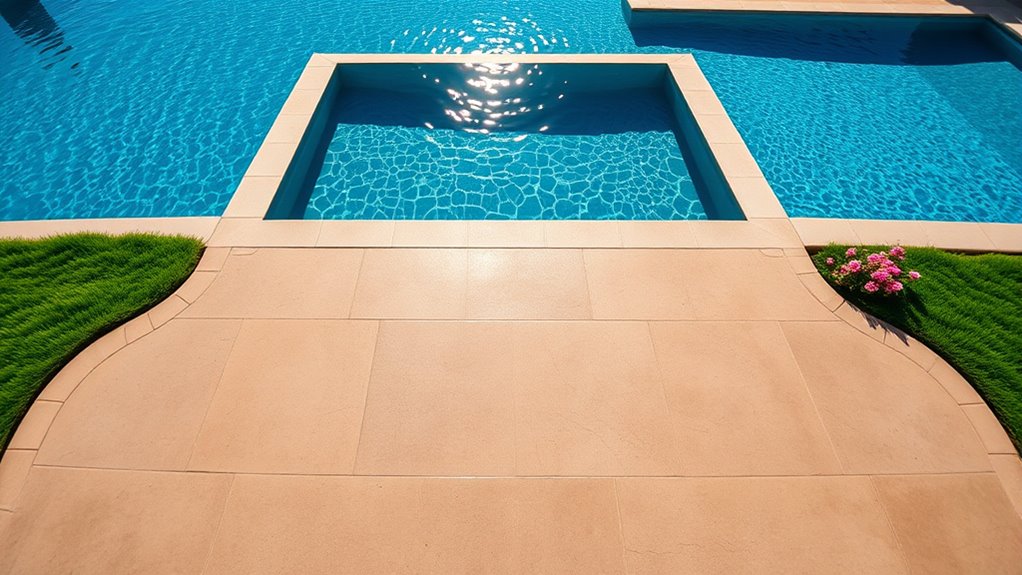
Choosing the right pool flooring is essential for safety, durability, and comfort. First, consider slip resistance; you want a surface that minimizes falls, especially when wet. Durability matters too—opt for materials that withstand constant exposure to water, chlorine, and UV rays without degrading. Comfort is key, so look for flooring that isn’t too hard or abrasive underfoot. Also, think about maintenance—some surfaces are easier to clean and more resistant to mold or algae growth. Budget plays a role, but investing in quality flooring pays off long-term. Finally, guarantee the material is compatible with your pool setup and local climate. Balancing these factors helps you select a flooring that enhances safety, lasts longer, and offers a pleasant experience every time you use your pool. Incorporating proper safety measures can further reduce the risk of accidents around your pool area.
Popular Flooring Materials for Endless Pools
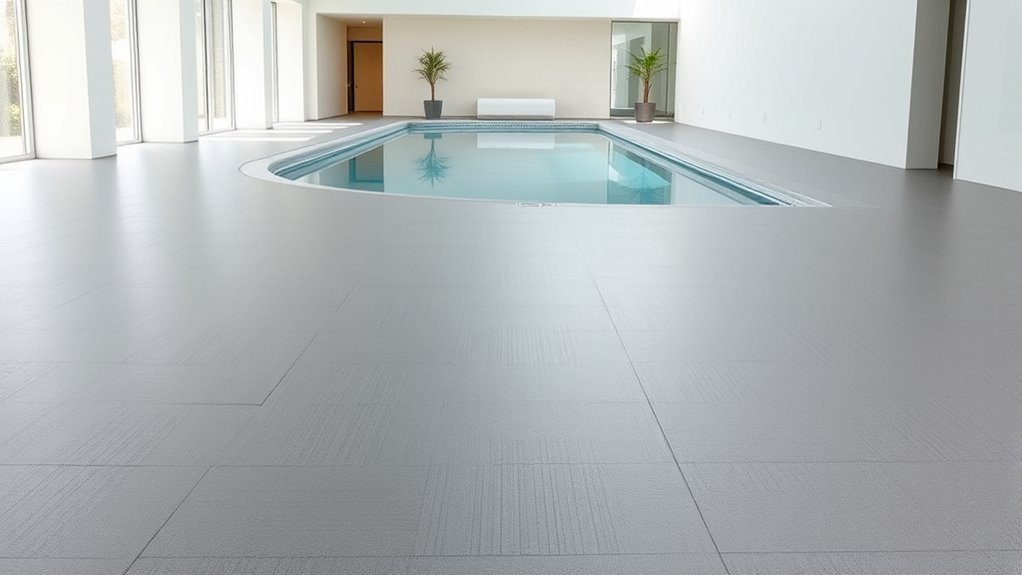
When choosing flooring for your endless pool, prioritize slip-resistant surfaces to guarantee safety. Water-resistant materials are essential to prevent damage and maintain durability over time. Combining these features helps create a practical and secure environment for your pool area. Additionally, selecting flooring that supports shared experiences can enhance the overall enjoyment and safety of your pool space.
Slip-Resistant Surfaces
Slip-resistant surfaces are essential for guaranteeing safety around your endless pool, especially if you enjoy frequent water workouts or family fun. These surfaces help prevent accidents caused by wet, slippery conditions. Materials like textured concrete, rubber mats, and specialized outdoor tiles are excellent choices because they provide reliable traction even when wet. When selecting a flooring material, look for options with slip-resistant coatings or patterns that enhance grip. Regular maintenance, such as keeping the surface clean and free of algae or debris, also improves safety. Keep in mind that slip-resistant surfaces not only protect your family but also extend the lifespan of your flooring by reducing wear caused by slips and falls. Understanding the science of slip resistance can help you choose the most effective flooring options for safety and durability. Prioritizing safety ensures your endless pool remains a fun and secure feature in your backyard.
Water-Resistant Materials
What makes a flooring material ideal for an endless pool? It must resist water damage, dry quickly, and withstand constant moisture. Water-resistant materials prevent warping, mold, and deterioration, ensuring longevity and safety. When choosing flooring, consider options that handle splashes, humidity, and regular cleaning without degrading. Additionally, selecting materials with high durability ensures long-term performance in a moisture-rich environment.
Benefits of Rubber and Foam Mats
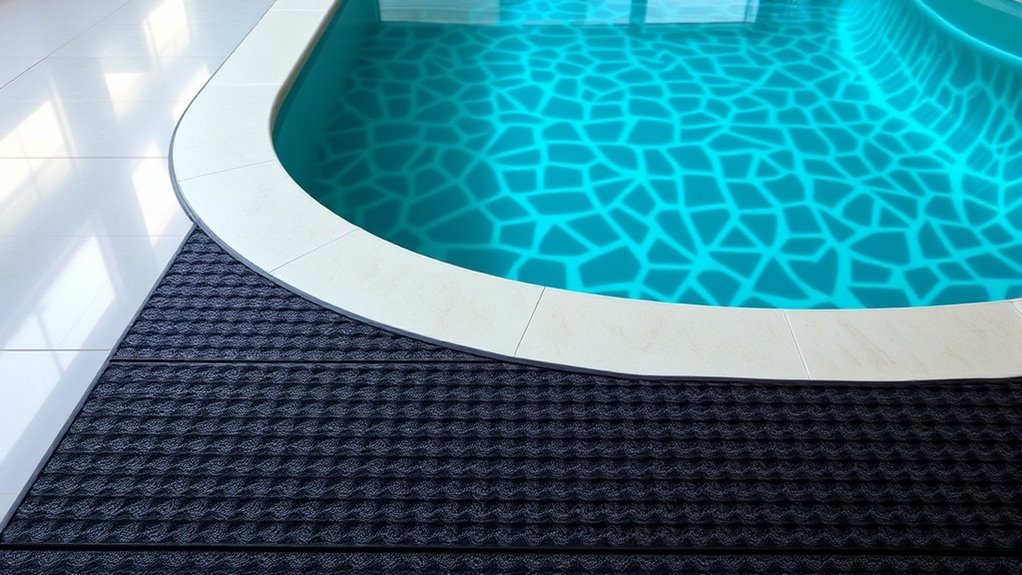
Rubber and foam mats offer practical benefits that make them popular choices for flooring around Endless Pools. They provide excellent shock absorption, reducing fatigue and protecting your joints during workouts. Their cushioning also minimizes the risk of slips and falls, creating a safer environment. These mats are highly durable, standing up well to water, chemicals, and heavy foot traffic, making them low maintenance. Additionally, they are easy to install and remove, allowing you to customize your space quickly. Rubber and foam mats also help insulate the floor, keeping the area warmer and more comfortable. Their flexibility makes them suitable for uneven surfaces, ensuring a flat, stable workout zone. Furthermore, choosing cybersecurity compliant mats can help protect your smart pool system from potential vulnerabilities. Overall, these mats combine safety, durability, and comfort, making them ideal for your pool area.
Advantages of Vinyl and Linoleum Surfaces
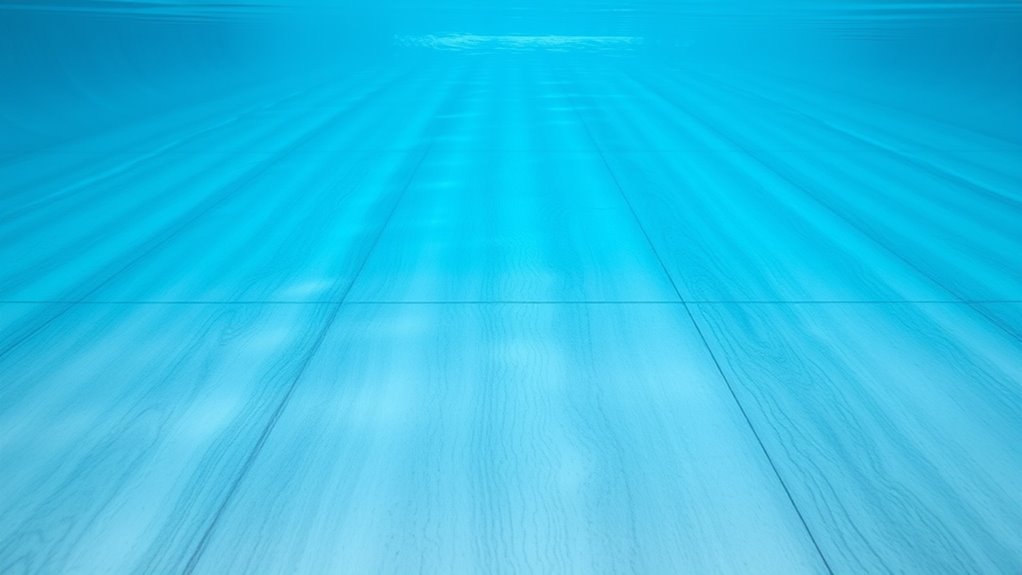
Vinyl and linoleum surfaces offer several key advantages for your Endless Pools area. They provide a durable, water-resistant foundation that withstands moisture and humidity, reducing the risk of damage over time. Their smooth surface makes cleaning quick and simple, helping maintain a hygienic environment. Additionally, both flooring types are softer underfoot compared to concrete or pavers, offering increased comfort during workouts or casual use. They also come in a variety of colors and patterns, allowing you to customize your space easily.
Here are three key benefits:
- Water resistance and durability
- Easy maintenance and cleaning
- Enhanced comfort and style
Why Concrete and Pavers Are Common Choices
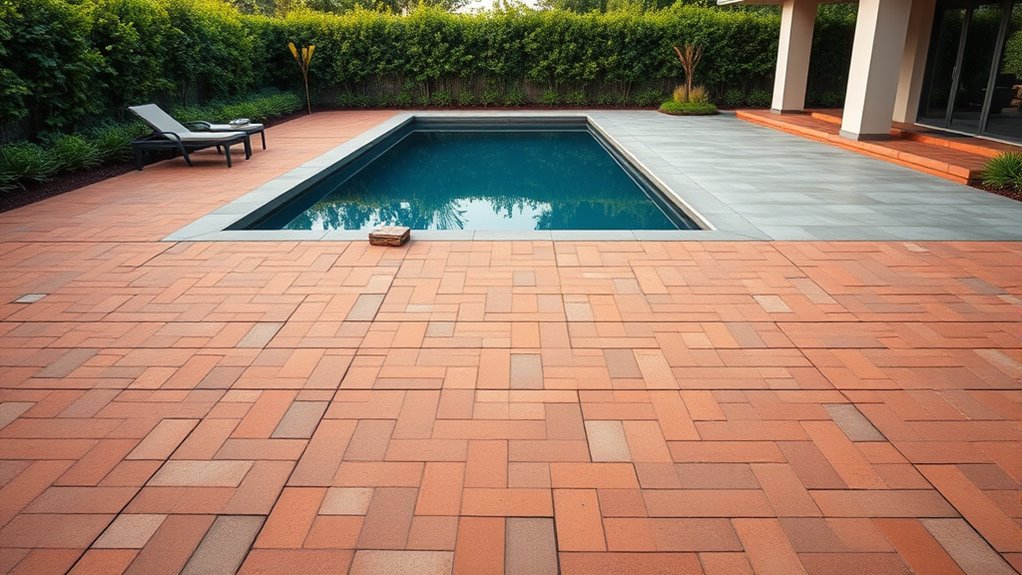
Concrete and pavers are popular choices for Endless Pools areas because they provide a sturdy, long-lasting foundation that can withstand heavy use and exposure to moisture. These materials offer excellent stability, reducing the risk of shifting or cracking over time. Concrete is versatile, allowing you to customize thickness and finish, making it suitable for various pool setups. Pavers, on the other hand, are easy to install and replace if damaged, and they add a decorative touch to your pool area. Both options resist water damage, preventing issues like erosion or mold growth. Additionally, concrete and pavers can support the weight of the pool and any accessories, ensuring safety and durability for years to come. Their robustness makes them reliable choices for your Endless Pool setup. Moreover, advancements in construction materials continue to enhance the longevity and resilience of these surfaces, making them even more suitable for outdoor aquatic installations.
Maintenance and Safety Tips for Pool Flooring
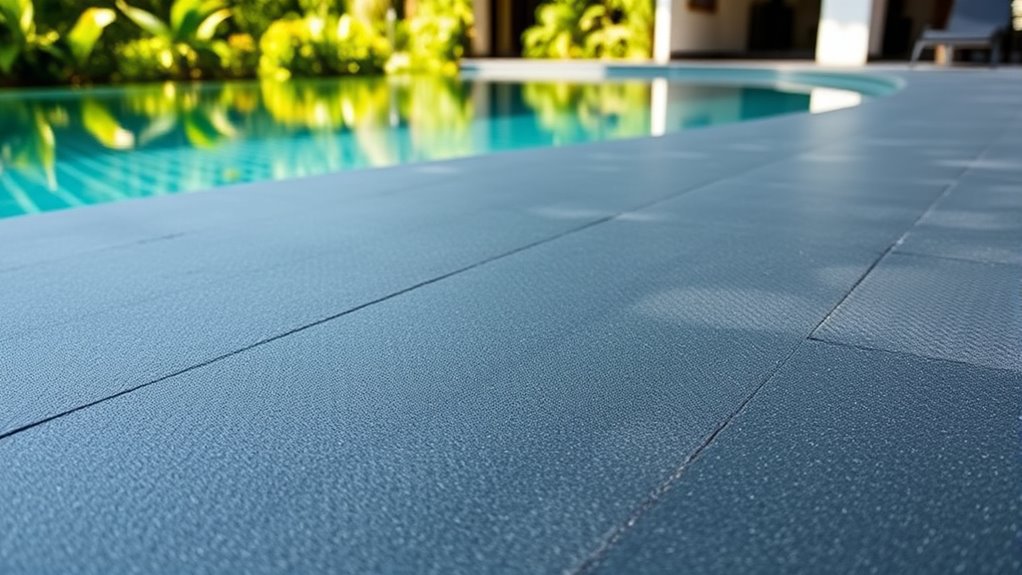
To keep your pool area safe and looking its best, you need to focus on slip-resistant surfaces, easy-to-clean materials, and regular upkeep. Choosing the right flooring can prevent accidents and reduce maintenance time. Let’s explore some practical tips to maintain your pool flooring effectively. Incorporating HEPA filtration principles can also help maintain a cleaner environment around your pool area by reducing airborne contaminants.
Slip-Resistant Surface Options
Choosing a slip-resistant surface for your Endless Pools is essential for safety and easy maintenance. A secure footing prevents falls and injuries, especially when the area gets wet. When selecting options, consider durability and grip. Here are three top choices:
- Textured Concrete – Offers excellent traction and withstands heavy foot traffic.
- Rubber Pavers – Soft underfoot, slip-resistant, and easy to replace if damaged.
- Rubberized Coatings – Create a seamless, non-slip surface that’s low-maintenance and customizable.
These options help minimize accidents while maintaining a clean, safe environment around your pool. Properly choosing and installing slip-resistant flooring guarantees your space remains safe and functional, no matter the weather or water splashes.
Easy-to-Clean Materials
Maintaining a clean pool area is essential for safety and longevity, especially since water and debris can quickly accumulate on flooring materials. Choosing easy-to-clean surfaces helps you keep the area hygienic and safe with minimal effort. Materials like textured vinyl, rubber tiles, or sealed concrete resist stains and are simple to wipe down or rinse off. Regular sweeping and quick cleaning prevent buildup and reduce mold or mildew growth. Here’s a quick comparison:
| Material | Cleaning Method | Benefits |
|---|---|---|
| Vinyl | Mop or hose down | Easy, quick maintenance |
| Rubber Tiles | Sweep and wipe | Durable, slip-resistant |
| Sealed Concrete | Water and mild cleaner | Long-lasting, low fuss |
Choosing the right easy-to-clean flooring makes your pool area safer and more inviting.
Regular Maintenance Routines
Regularly inspecting your pool flooring is essential to catch issues early and guarantee safety. Frequent checks help identify loose tiles, cracks, or signs of wear before they become hazards. Establish a routine to evaluate the surface after each use or weekly, depending on usage.
To maintain safety and longevity, consider these steps:
- Clean the flooring with a gentle brush and mild detergent to prevent mold and algae buildup.
- Tighten or replace any loose or damaged tiles immediately.
- Check for uneven spots or cracks that could cause slips or falls, and repair them promptly.
Consistent maintenance not only preserves the appearance but also ensures your pool area remains safe and functional over time.
Frequently Asked Questions
How Much Does Different Flooring Types Typically Cost?
You can expect to pay anywhere from $3 to $15 per square foot for different flooring types. Vinyl is usually the most affordable, costing around $3 to $7 per square foot. Rubber flooring ranges from $4 to $10, offering durability. Foam and interlocking tiles typically cost $5 to $15. Keep in mind, installation costs can add to your total, so budget accordingly based on the material you choose.
Can I Install Flooring Myself or Should I Hire a Professional?
You can install flooring yourself, but it depends on your experience. If you’re handy and comfortable with tools, you might tackle it to save money. However, the job can be tricky—precise measurements, proper leveling, and moisture barriers are essential. If you’re unsure or want flawless results, hiring a professional guarantees safety, durability, and a perfect finish. Don’t risk costly mistakes; sometimes, expert help is worth the investment.
How Do I Prevent Mold and Mildew on Pool Flooring?
To prevent mold and mildew on your pool flooring, keep the area well-ventilated and dry. Regularly clean the surface with a mild disinfectant and guarantee proper drainage to avoid standing water. Use mold-resistant materials like sealed concrete or vinyl, and consider installing a dehumidifier if humidity levels are high. These steps help maintain a clean, safe environment around your endless pool.
What Flooring Options Are Eco-Friendly and Sustainable?
You should consider bamboo flooring, an eco-friendly and sustainable choice. For example, a homeowner in California installed bamboo under their endless pool, enjoying its rapid growth and minimal environmental impact. Bamboo is durable, moisture-resistant when treated properly, and adds a natural aesthetic. By choosing bamboo, you support sustainable forestry while creating a stylish, eco-conscious space that complements your pool area perfectly.
How Long Does Each Flooring Material Usually Last?
You’ll find that vinyl flooring typically lasts 10 to 20 years with proper care, making it a durable choice. Concrete can endure 30 or more years, especially if sealed and maintained regularly. Tile often lasts 25 to 50 years, depending on quality and installation. Laminate floors usually last 10 to 15 years, but they can be less resistant to moisture. Regular upkeep guarantees your flooring reaches its maximum lifespan.
Conclusion
Choosing the right flooring under your endless pool is like laying a strong foundation for a safe, serene oasis. Whether you opt for the bounce of foam, the resilience of concrete, or the smoothness of vinyl, each surface symbolizes stability and comfort. By selecting wisely, you craft a sanctuary where relaxation flows effortlessly, and safety is your guiding light—transforming your pool area into a personal retreat that stands the test of time.

